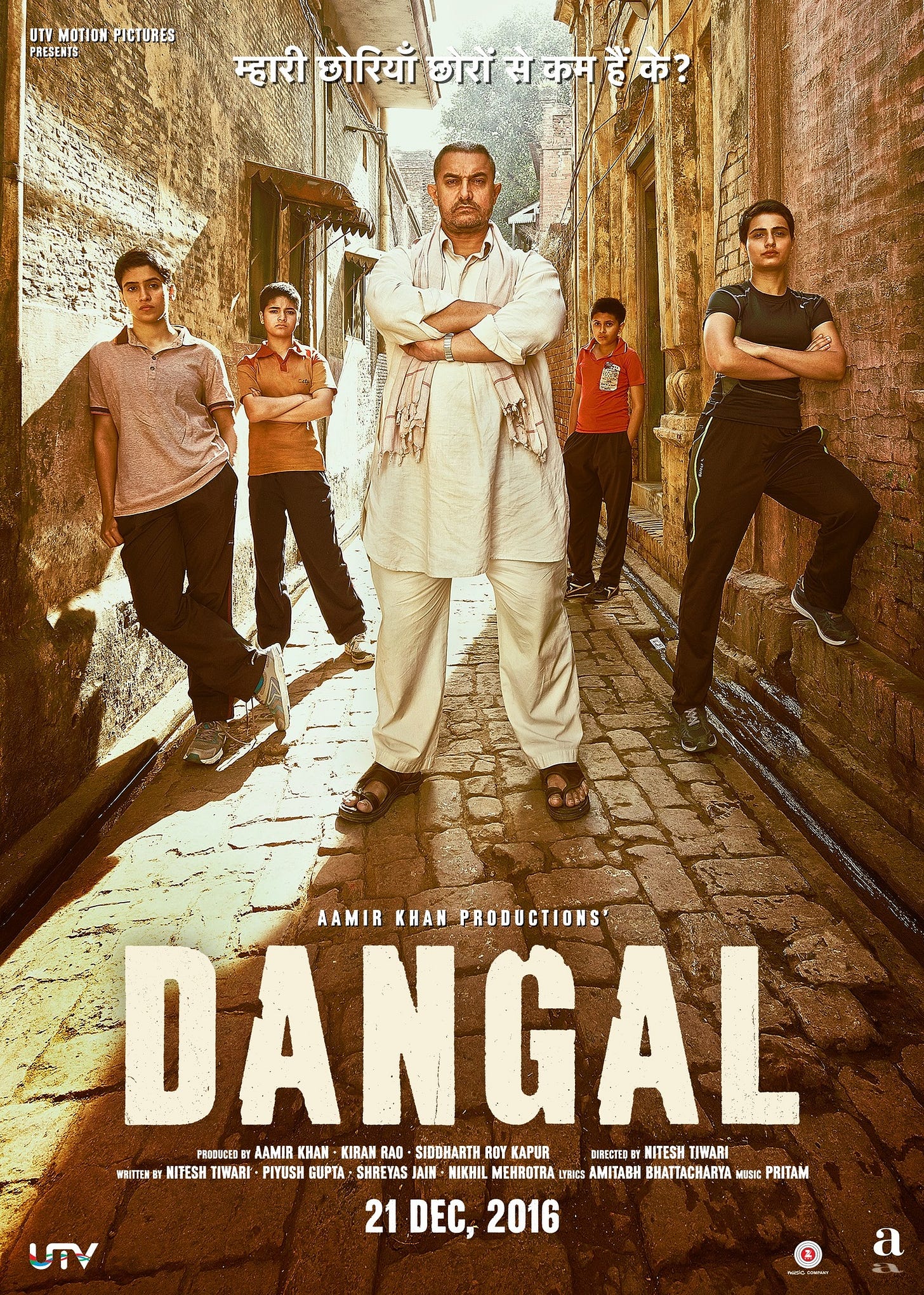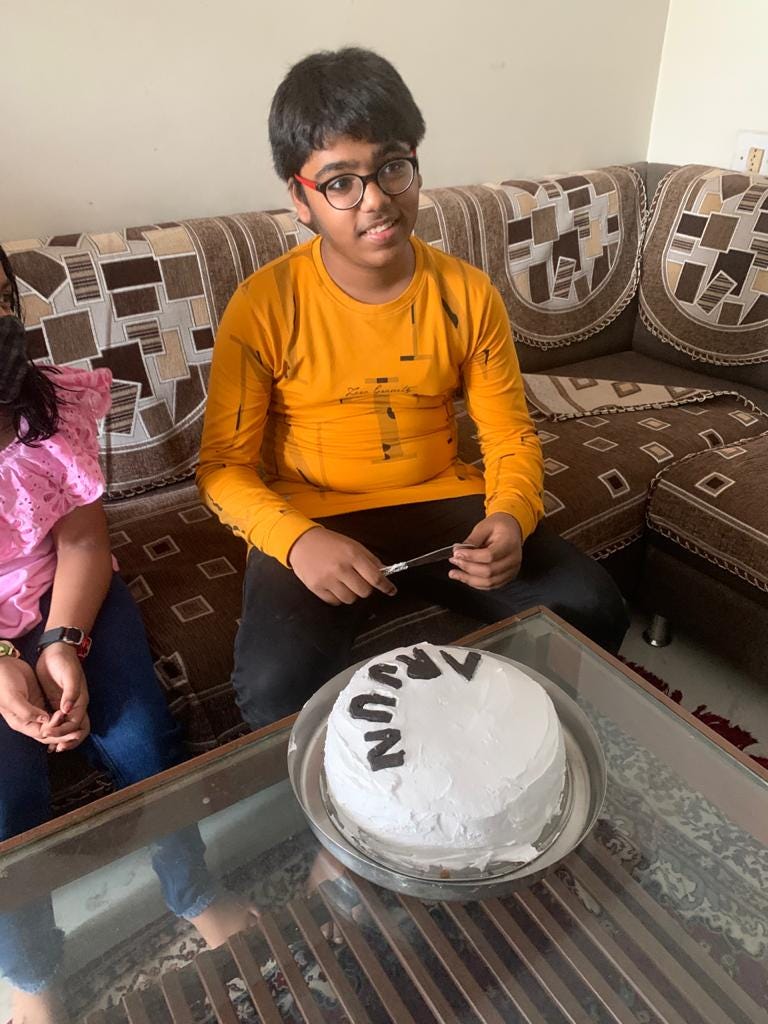"Dangal" (2016)—The Heart Of A Champion
+Guest Posts: Movie Wisdom By Guest Writer Arjun Agarwal—Issue #8
Image by L.E. Wilson from RedBubble
The Movie:
Dangal (2016) is a comedy co-written and directed by Nitesh Tiwari—based on a true story centered on the Phogat family—about a former wrestler who trains two of his daughters for an international wrestling competition.
Life Lesson: In order to win, you have to fight for yourself.
🍿Movie Scene Link (movie quote)
Guest Writer:
Arjun Agarwal writes an eponymous newsletter for storytellers and entrepreneurs
Dangal by Nitesh Tiwari is a wonderful film which explores the journey of Mahavir Singh Phogat and his daughters Geeta Phogat and Babita Kumari Phogat. Set in a rural area of India, we meet Mahavir, a former wrestler who had dreams of winning a gold medal for his country in an international competition, but due to financial troubles, failed. He still has hope that his children will someday achieve his dream; however, he is blessed with four daughters and zero sons. At that time girls were forbidden to take part in contact sports, and this is still true in some places today. Mahavir loses all hope to realize his dream. But then one day everything changes. The parents of two boys come to his front door with a complaint. Geeta and Babita had mercilessly beaten up their kids. It is then that Mahavir Phogat realizes that his daughters have the potential to be world class wrestlers, but how can he motivate them to achieve it?
This is where a masterclass in communication begins. Mahavir Phogat messes up at times. But he learns from his mistakes and makes sure not to repeat them. This is what makes him both a good athlete and a good leader. He learned to create an eager want in others. This is an important characteristic of good leaders. They make you feel that you want what they want. At one point in the film his wife, Daya Kaur (Sakshi Tanwar), argues that “wrestling is for boys.” To which Mahavir responds, “You think our girls are any less than boys?”
Some time later we see another conversation,
Daya Kaur: The entire village is laughing at us. Who will marry our girls?
Mahavir Singh: I will make our girls so capable, that boys will not choose them. They will choose boys!
Throughout the first act there are many parts where the wife is the voice of society trying to discourage Mahavir. However, his replies are iconic to say the least. Every response is better than those found in pseudo-feminist books. He creates an eager want in his wife to see their daughters succeed, to be better off, and more respected. However, Mahavir fails to arouse this same want in his daughters. They both rebel against him. One day they sneak out to a wedding celebration, but Mahavir catches them. He doesn’t say anything; it's his silence which humiliates them. But their attitude toward him flips 180 degrees when they have a talk with the child bride, Sunita (Ishika Gagneja).
Babita: We missed training just for a day. […]
Geeta: What kind of father forces his daughters to become wrestlers? Makes them wake up at 5 a.m. to run? Works them like slaves? Makes them fight boys? And if they protest, he cuts their hair. May God never give anyone such a father.
Sunita: I wish God had given me such a father. At least your father thinks about you. Otherwise, our reality is, the moment a girl is born, teach her to cook and clean, make her do all the household chores. And, once she turns 14, marry her off. Get rid of the “burden”! And hand her over to a man, whom she has never seen before. Make her bear children and raise them. That’s all she’s good for. At least your father considers you his child. He is fighting against the whole world. He is silently tolerating their taunts. Why? So that the two of you can have a future, a life. What is he doing wrong?
This clarifies everything in Geeta and Babita’s eyes. They realize that their father was not punishing them; he was trying to make them capable and independent. What Sunita achieved was to unite the goals of Geeta and Babita with those of Mahavir. This is the end of the first act.
The rest of the film explores many more obstacles in Geeta, Babita, and Mahavir Phogat’s journey and gives many great lessons which this post is too short to contain. But none of that would be possible if Mahavir Phogat hadn't been able to unite his goal with his wife’s, and Sunita hadn't united Geeta and Babita’s goal with Mahavir’s.
There is a basic rule in dealing with people. The conversation begins when the goals unite. The work begins only after the goals unite. If people have different goals, they are not having a conversation. It is an argument. And as Dale Carnegie once said, “the only way to win an argument—is to avoid it.”
moviewise Review:
The word “Dangal” refers to a traditional form of Indian wrestling, which is the focus of the 2016 Hindi-language movie by the same name. If you have never seen a Bollywood film before, this is a good entry point into a magical world of filmmaking. You will like this movie, and you should watch it. At almost three hours long, it’s actually two movies in one, so it’s quite a bargain. Dangal has heart, humor, and all the excitement of a sports championship movie, but there’s more. It’s hard to do it justice in a review because the storyline is complex and very unusual. It’s a very modern movie about old-fashioned ideas.
This movie has a gentle message about how traditions, these bits of wisdom that are passed down through the generations, aren’t all bad, but some really are. And it’s a difficult challenge for all of us to find the right path between opposing forces. Dangal shows that struggle. We really don’t know where the movie is headed, who the good guys are, how it will all end. It’s rare, and quite a gift, to watch a movie that surprises you and doesn’t feel predictable. So this is indeed an excellent movie that is masterfully and impressively made as well as acted. It really especially puts most contemporary Hollywood movies to shame.
Inspired by a true story about a wrestling coach and his daughters, the lesson in it is heartfelt and hard-earned: Champions don’t just happen, they must be nurtured and guided. But the heart of a champion beats alone. No one can make you want to win, except you, and you have to triumph on your own.
There is a lot more going on in this movie, however, and audience members are left to decide what is more important to them: a traditional life, or taking a path that few will understand. Maybe there is no wrong answer, but maybe having more choices available is better—for everyone. If this conflict were turned into a poem that captures the sentiment, it would be “The Road Not Taken,” particularly the ending lines:
Two roads diverged in a wood, and I—
I took the one less traveled by,
And that has made all the difference.
Want to publish your very own guest post on moviewise: Life Lessons From Movies and share with the world your most impactful, most wonderful, and most profound movies? Reply to this or leave a comment below to get started 🤗.
Visit the moviewise catalogue—a searchable database of one sentence movie summaries, movie quotes, and movie wisdom—for movie recommendations.
Also visit the moviewise store. Get a t-shirt, bag, or pillow with your favorite #LifeLesson from a movie. Reply to this or leave a comment below to make a request.











I love Arjun's quote, "If people have different goals, they are not having a conversation. It is an argument." Oh boy, isn't that the case. Listening (and not talking) is an undervalued gift...and if this film "We really don’t know where the movie is headed, who the good guys are, how it will all end. It’s rare, and quite a gift, to watch a movie that surprises you and doesn’t feel predictable" ala moviewise, I'm in!
Very interesting stuff. Might have to check the movie out.